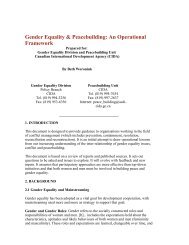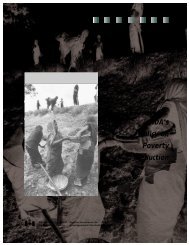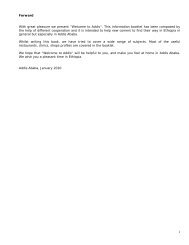Concepts and practices in agricultural extension in developing ...
Concepts and practices in agricultural extension in developing ...
Concepts and practices in agricultural extension in developing ...
- No tags were found...
You also want an ePaper? Increase the reach of your titles
YUMPU automatically turns print PDFs into web optimized ePapers that Google loves.
level. The ‘push’ is the temptation for other agencies to use <strong>extension</strong> because it is the most widelydistributed apparatus for contact with rural communities. The ‘pull’ is that the agents are will<strong>in</strong>g to takeon other duties, especially <strong>in</strong>put distribution, because such tasks often <strong>in</strong>crease an <strong>extension</strong> agent’s<strong>in</strong>fluence over farmers, as well as provid<strong>in</strong>g opportunities to extract rents which compensate for lowsalary. Both have implications for the effectiveness of the <strong>extension</strong> service.Operat<strong>in</strong>g resources <strong>and</strong> fiscal susta<strong>in</strong>abilityInadequate public fund<strong>in</strong>g has been a historic problem confront<strong>in</strong>g the service delivery function of<strong>extension</strong>. Accord<strong>in</strong>g to Antholt (1994), the T&V <strong>extension</strong> system actually exacerbated operationalfund<strong>in</strong>g problems by <strong>in</strong>creas<strong>in</strong>g staff<strong>in</strong>g, <strong>and</strong> typically cost 25–40% more than multipurpose <strong>extension</strong>(Feder <strong>and</strong> Slade 1993).Much <strong>in</strong>formation dissem<strong>in</strong>ated by <strong>extension</strong> is a ‘public good’, <strong>and</strong> dissem<strong>in</strong>ation costs cannot beeasily recovered from <strong>in</strong>dividuals. Thus there is direct dependency on direct public fund<strong>in</strong>g. Fixed costfor salaries is very high, <strong>and</strong> operat<strong>in</strong>g costs are treated as a residual, which makes them vulnerable <strong>in</strong> abudget shortage. If the government has to cut the operat<strong>in</strong>g budget, there are obvious consequences foreffectiveness if <strong>extension</strong> agents cannot get to the field, caus<strong>in</strong>g operational as well as moral problems(Ax<strong>in</strong>n 1988).Interaction with knowledge generation (Research–Extension, Extension–Farmer l<strong>in</strong>kages)Insufficient relevance of new technology necessary to improve productivity is one of the most commonconstra<strong>in</strong>ts <strong>in</strong> <strong>extension</strong>, <strong>and</strong> a major constra<strong>in</strong>t <strong>in</strong> ra<strong>in</strong>fed, resource-poor environments (Ax<strong>in</strong>n 1988;Purcell <strong>and</strong> Anderson 1997). The <strong>in</strong>herent problem is that <strong>extension</strong> dissem<strong>in</strong>ates <strong>in</strong>formation <strong>and</strong> advicegenerated by a knowledge-generat<strong>in</strong>g system which is generally not under <strong>extension</strong> management. Veryoften research <strong>and</strong> <strong>extension</strong> tend to compete for power <strong>and</strong> resources, <strong>and</strong> fail to see themselves as partof a broader <strong>agricultural</strong> technology system. This is further aggravated by donors <strong>in</strong> many circumstances.Kaimovitz (1991) identified the follow<strong>in</strong>g obstacles to effective research–<strong>extension</strong> l<strong>in</strong>ks:• Historical perceptions: Policy makers still fail to recognize research <strong>and</strong> <strong>extension</strong> as closely<strong>in</strong>terdependent activities. The generally higher status of researchers tends towards patroniz<strong>in</strong>gbehaviour that is resented by <strong>extension</strong> agents.• Resistance to coord<strong>in</strong>ation: Coord<strong>in</strong>ation is perceived as limit<strong>in</strong>g autonomy by both sides.• Goals may differ: The two organizations may not share the same goal. Researchers are more<strong>in</strong>terested <strong>in</strong> produc<strong>in</strong>g scientific papers, <strong>and</strong> therefore may not generate research relevant tofarmers. On the other h<strong>and</strong>, <strong>extension</strong> agents may be more rewarded by distribut<strong>in</strong>g <strong>in</strong>puts <strong>and</strong>credit.• No pressure: Lack of effectively organized outside pressure groups, such as national policymakers, donors, farm organizations, or private companies may hamper cooperation.Some of the mechanisms tried by selected countries <strong>in</strong> Eastern <strong>and</strong> Southern Africa (ESA) to enhanceresearch–<strong>extension</strong> l<strong>in</strong>kages are summarized <strong>in</strong> Table 2.2.Generic problems cannot be seen <strong>in</strong> isolation. They are <strong>in</strong>terrelated <strong>and</strong> often represent conflict<strong>in</strong>gimperatives. Pressures may exist to maximize coverage while m<strong>in</strong>imiz<strong>in</strong>g costs, to emphasize firmmanagement control while ensur<strong>in</strong>g bottom–up participation, <strong>and</strong> <strong>in</strong>crease human resource competencewhile exploit<strong>in</strong>g cost-sav<strong>in</strong>g potential of mass media (World Bank 1990). Kaimovitz (1991) recordedthat low salaries, limited operat<strong>in</strong>g resources, an unclear m<strong>and</strong>ate led to general decl<strong>in</strong>e <strong>in</strong> morale. This40





